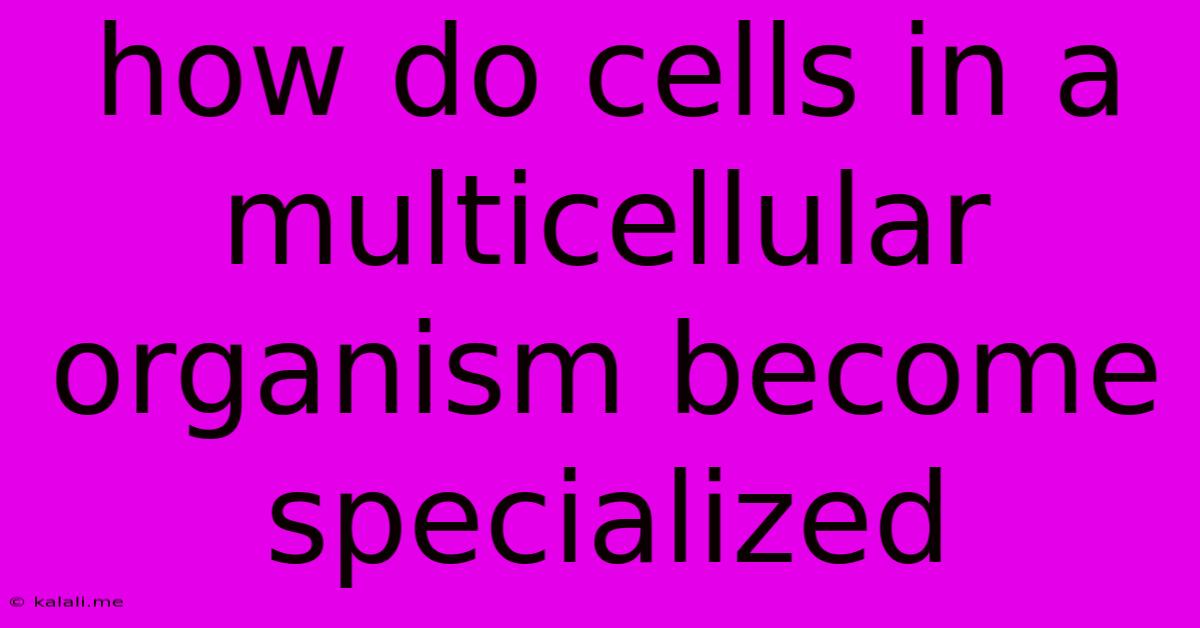How Do Cells In A Multicellular Organism Become Specialized
Kalali
May 10, 2025 · 3 min read

Table of Contents
How Cells in a Multicellular Organism Become Specialized: A Deep Dive into Cell Differentiation
Meta Description: Discover the fascinating process of cell differentiation, learning how a single fertilized egg develops into a complex multicellular organism with specialized cells like neurons, muscle cells, and more. Explore the roles of gene expression, signaling pathways, and environmental factors in this intricate biological process.
Multicellular organisms, from the smallest insects to the largest whales, are marvels of biological engineering. What makes this complexity possible? The answer lies in cell differentiation, the process by which a single fertilized egg, or zygote, develops into a vast array of specialized cells, each with unique structures and functions. This article explores the mechanisms behind this remarkable transformation.
The Power of Gene Expression
At the heart of cell differentiation lies gene expression. Each cell in your body contains the same complete set of genes, yet different cells express different subsets of these genes. This differential gene expression dictates which proteins are produced, ultimately shaping the cell's identity and function. Imagine a vast library containing every book ever written – each cell only chooses to read (express) a specific selection of these books, creating its unique identity.
Several factors contribute to this selective gene expression:
- Transcription factors: These proteins bind to specific DNA sequences, regulating the transcription of genes into RNA. Different combinations of transcription factors in different cells lead to distinct patterns of gene expression.
- Epigenetic modifications: These are heritable changes in gene expression that don't involve alterations to the underlying DNA sequence. They include DNA methylation and histone modification, which can either activate or silence genes.
- Signaling pathways: Cells communicate with each other through signaling molecules, which trigger intracellular cascades that influence gene expression. These pathways are crucial for coordinating the development and differentiation of different cell types.
The Role of Cell Signaling and Environmental Factors
Cell differentiation is not a solitary process; it's a highly coordinated event involving intricate communication between cells and their environment. Cell signaling plays a pivotal role, with neighboring cells exchanging signals that influence each other's differentiation pathways. This communication ensures that cells differentiate into the correct types and locations within the organism.
Furthermore, environmental factors also significantly impact cell differentiation. These can include physical factors like temperature and pressure, and chemical factors such as hormones and growth factors. For example, the presence of specific growth factors can stimulate a cell to differentiate into a particular type, while their absence may lead to a different fate.
Stem Cells: The Masters of Differentiation
Stem cells are undifferentiated cells that have the capacity to self-renew and differentiate into various cell types. They are crucial for development, tissue repair, and maintaining the body's homeostasis. Different types of stem cells exist, with varying levels of differentiation potential:
- Totipotent stem cells: Can differentiate into all cell types, including extraembryonic tissues.
- Pluripotent stem cells: Can differentiate into all cell types of the body, but not extraembryonic tissues.
- Multipotent stem cells: Can differentiate into a limited number of cell types.
- Unipotent stem cells: Can only differentiate into one cell type.
Examples of Cell Specialization
The process of cell differentiation leads to a remarkable array of specialized cell types, each with a unique role in the organism's functioning. Examples include:
- Neurons: Transmit electrical signals throughout the nervous system.
- Muscle cells: Generate force and movement.
- Epithelial cells: Form protective barriers and linings in organs and tissues.
- Blood cells: Transport oxygen, fight infection, and maintain blood clotting.
Conclusion: A Symphony of Cellular Specialization
Cell differentiation is a complex and fascinating process that underpins the development and function of all multicellular organisms. The intricate interplay of gene expression, cell signaling, and environmental factors orchestrates the creation of a diverse range of specialized cells, contributing to the overall complexity and functionality of the organism. Continued research in this field promises to unlock even deeper insights into the mechanisms governing cellular specialization and their implications for human health and disease.
Latest Posts
Latest Posts
-
Why Did The Obtuse Angle Go To The Beach
Jul 03, 2025
-
How Much Is Three Quarts Of Water
Jul 03, 2025
-
How Tall Is A 3 Story Building
Jul 03, 2025
-
Is Miranda Cosgrove Related To Jimmy Fallon
Jul 03, 2025
-
What Is 1 4 Of A 1 4 Cup
Jul 03, 2025
Related Post
Thank you for visiting our website which covers about How Do Cells In A Multicellular Organism Become Specialized . We hope the information provided has been useful to you. Feel free to contact us if you have any questions or need further assistance. See you next time and don't miss to bookmark.